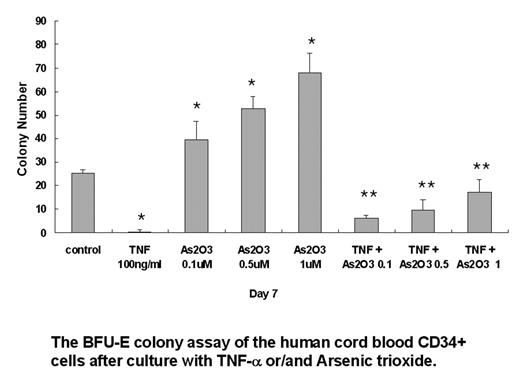Abstract
The anemia of chronic disease-which encompasses inflammation, infection, tissue injury, and conditions associated with the release of proinflammatory cytokines (such as cancer)- is one of the most common forms of anemia seen clinically. Symptomatic anemia requires treatment. The two major forms of treatment are transfusions and erythropoietin. Arsenic trioxide (As2O3) used to treat human diseases for centuries in traditional Chinese medicine. Our recent studies suggest that low dose of As2O3 induces erythroid differentiation of K562 human leukemic cells and high dose of As2O3 induce apoptosis. In this study, we have investigated in vitro effect of As2O3 on the erythroid differentiation and it could inhibit TNF-α induced suppression of erythroid differentiation of human cord blood CD34+ cells. Expression of glycophorin A was 35.94 ± 7.94% after 7 days culture of human cord blood CD34+ cells and was decreased to 17.63 ± 7.33% when culture of human cord blood CD34+ cells with 100ng/mL of TNF-α. Expression of glycophorin A was increased in dose dependent manner after 7 days treatment with As2O3 and As2O3 increased percentage of glycophorin A in culture with TNF-α compared to TNF-α alone. The results of colony assay of CFU-MIX and BFU-E after culture with various conditions revealed similar patterns with expression of glycophorin A. These results suggest that As2O3 induces erythroid differentiation of human cord blood CD34+ cells and can reverse TNF-α induced suppression of erythroid differentiation of human cord blood CD34+ cells.
The BFU-E colony assay of the human cord blood CD34+ cells after culture with TNF-α or/and Arsenic trioxide.
The BFU-E colony assay of the human cord blood CD34+ cells after culture with TNF-α or/and Arsenic trioxide.
Author notes
Corresponding author


This feature is available to Subscribers Only
Sign In or Create an Account Close Modal